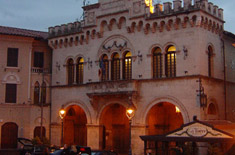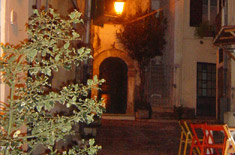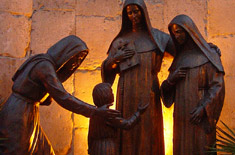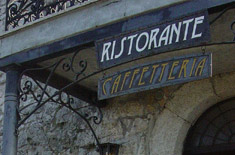Italian Countryside
Bongiorno! You got it, we’re in Italy! Now, they say that all roads lead to Rome, but they also lead out of Rome, too. So we’re going to take the road less traveled. There’s a beautiful area outside of Rome, between Rome and Naples, called Lazio in the Italian countryside. It’s filled with wineries, hot springs, and beautiful little medieval villages.
This thousand-year old land area is known as the historical area of Ciociaria, named for the ancient footwear worn by local shepherds. The history and spirit of Ciociaria was shaped during the first centuries of the middle ages from all of the attention it received from the Roman Catholic Church and its popes.
Located in the heart of Ciociaria is a charming spa town called Fiuggi. Known for its restorative waters, Fiuggi is an ideal vacation destination, just a short drive from Rome. While it boasts world-class hotels and tourist facilities, it never feels like an over-crowded resort. Fiuggi is still a little medieval town in the heart of the Roman countryside, with old-fashioned rural traditions that celebrate culture, nature and a love of life.
But Fiuggi is most famous for its natural spring, whose water is said to cure kidney stones and liver disease. This “water cure,” was made popular by Michelangelo, who accidentally discovered it while looking for a new marble quarry. His kidney stones were supposedly dissolved after drinking water from the spring. Later, Pope Boniface VIII, reputedly, had gallons and gallons of Fiuggi’s curative waters shipped to the Vatican….and the “water cure” was born.
Today, the spring remains the big draw in Fiuggi. While not as miraculous as Lourdes, visiting the natural spring, and drinking its water, has become a pilgrimage for thousands of visitors annually.
Two springs, Fonte di Bonifacio VIII, the more ancient of the two, and Fonte Anticolana, have earned Fiuggi the distinction of being the most famous spa in Lazio and one of the most internationally celebrated places in the world. They say the waters in the fountains are healing because they’re volcanic and slightly radioactive. Good for kidney stones and liver.
The town of Fiuggi is comprised of two parts, the upper and lower. The area where the springs are located is called new Fiuggi, or Fiuggi Fonte, at the base of the hill (it was developed during the middle ages so it’s not all that new!!). The upper part or old Fiuggi, is located 2500 feet above sea level. The natives call it “Fiuggi Citta”
Fiuggi Citta is a medieval fortified village, which was around even before Roman times. If you like old stone villages, you’re in the right place! This whole area is dotted with these little medieval villages. You know, they all have something in common. They’re all built on a mountain top, they’re all made out of stone, and they all involve a lot of walking. Whew.
Speaking of walking, in olden times, most residents reached their homes by climbing hundreds of steps, most of which are still intact today. And since cars are prohibited in most parts of the old town, you can walk around freely like you own the place! It ‘s so picturesque! It seems everywhere you look is a ‘photo op.’ The scenery and the ambience is molto bello!
It’s like walking into a painting… no wonder Italy inspired so many great artists! As you’re walking around the old town, you’ll see signs up on the wall that’ll tell you what the building used to be.
Can you imagine living here? Walking out of your house every morning and seeing this natural beauty. It’s almost like living a fairy tale. Wow, and if you think this is pretty wait ‘til the sun goes down. Once the sun sets, the old medieval walls of Fiuggi are transformed into something almost magical. The evening, when all the shadows are out. The lights are on. The people are inside having dinner and you have the village to yourself.
However, after all this walking and climbing, when the sun goes down, most likely you’ll be ready for bed! The only hotel is the best hotel, the Grand Hotel Palazzo Della Fonte. Built in 1912 to be the most elegant and modern hotel in Europe, the Della Fonte is still one of the most sought after spots in the Roman countryside. Politicians, celebrities and “travelers with a taste for the best” are just of few of its discerning clientele. You’ll definitely enjoy the VIP treatment here, as its exclusive atmosphere and charm have been captivating guests for more than 90 years. The next time you’re in Fiuggi, be sure to add your name to the guest book that already includes everyone from royalty to the rich and famous!
Getting lost in Fiuggi is half the fun, you just never know what you’re going to find! I guarantee you’re in for a few surprises! One surprise is that Fiuggi is also known for its chestnut trees!
One of the best things about Fiuggi is its location right between Rome and Naples, making it an ideal place to set up as base camp for a multitude of fascinating road trips. Don’t feel like driving? That’s okay, there are shuttle buses that will carry you to most destinations. If you’re craving a little civilization, you can hop a bus back up to Rome for a day-long shopping spree! Shopping in Rome can leave you dizzy, especially after all of that rest and relaxation back in Fiuggi, but I know you can handle it.
From the great design houses to one-of-a- kinds, there’s something for everyone on your shopping list…don’t forget me! And the friendly sales people and convenient credit cards make you forget all about the high prices! Don’t want to lug all of your new purchases on the bus back to Fiuggi? No worries! Most shops will ship your treasures home to you!
On your way back to Fiuggi, make sure you take the Appian Way, the most ancient road leading in and out of Rome! Continuing back to Fiuggi, save some time to explore the Castelli Romani region and Castel Gandolfo, the summer home of the Pope.
The Papal Palace, in the Alban Hills over-looking Lake Albano, has been the official summer residence of the Pope since the 17th century. Believed to have been built on the site of ancient Alba Longa, the traditional and powerful rival of Rome, Castel Gandolfo is officially part of the Vatican and was featured in the best-selling novel, The Da Vinci Code.
Keeping with the religious theme of Ciociaria, another short drive from Fiuggi, is one of the holiest places of Roman Catholicism – Monte Cassino. Originally erected from an ancient converted temple to the God Apollo, Monte Casino was called, at one time, the “medieval Athens in the night of many centuries.”
The monastery at Monte Cassino was established in 529 by St. Benedict, founder of the Benedictine monks. It was here that St. Benedict drew up a complete and precise set of rules combining intellectual study and manual labor with the virtues of chastity, obedience and poverty. Those qualities are said to quite possibly be the only reason the abbey remains today.
During WW II, the Germans made Cassino their stronghold, guarding the approaches to Rome. On May 17, 1945, the Allies launched their final assault in the Battle of Cassino, which resulted in thousands of deaths and the complete destruction of the abbey, which was leveled to the ground.
Monte Casino rose from the ashes defiantly, with construction beginning even before the war ended. The splendor you see today was built in 1945 and is an exact duplicate of what was there before the bombs fell. You gotta love the Italian perseverance….and you gotta see this place to believe it!
Another short drive from Fiuggi is another city on a hill, the town of Fumone. Known as the “Olympus” of the Ciociaria region, Fumone dominates over more than forty surrounding villages, due to its extreme height of over 2600 feet. Now, there’s not a lot to do there, but it sure is pretty. Castello Marchesi Longhi de Paolis di Fumone or, simply, Fumone Castle to us Anglos, has a few legends and ghost stories that are sure to keep you entertained for hours!
The castle is an ancient feudal residence from the 10th century with a colorful and obscure history including its purchase in 1588 by the Longhi family who were descendants of Pope Boniface III. Now a popular bed and breakfast, Fumone Castle is still owned by the Longhi family today. The locals feel this castle is important for many reasons. The principal is religious. The second is military.
The first is correlated to a story that happened 700 years ago. In 1295, the castle was the principal prison of the Vatican State to south of Rome. The military significance of the castle’s history derives its name from fumoni or “big smoke” in Italian. During the Roman Ages and the Middle Ages, it was possible to see smoke from the castle through fifty cities from Naples to Rome. The owner was able to signal Rome three days before enemies arrived in the city.
The story I like is the enchanting ghost story of a young boy killed for jealousy and the grieving mother who walks the halls of the castle to this day. The mummified body of the unfortunate child remains in the castle, a haunting reminder of his untimely demise. If you’re superstitious like I am, you might want to knock on wood before leaving the castle.
A cannon balls’ throw away is the neighboring village of Vico nel Lazio. It’s just a short train ride away, or hop in your rented Ferrari or Lamborghini and go for it! A small ancient town of only 2,048 inhabitants, Vico nel Lazio is a masterpiece of medieval military architecture that is often compared with the French town of Carcassonne.
It still has a town’s belt of 12th century ramparts embellished by twenty-four towers and four gates. Its cobblestone streets and walkways couple with impossible stairways careening precariously through stone faced buildings almost daring you to play hide and go seek! The gardens and the trees are breathtaking nearly all year round.
Perhaps the best-preserved structures are the elegant Governor’s Palace and the Church of St. Michele Arcangelo. Make sure you bring plenty of film for your camera because Vico nel Lazio is unlike any place you’ve ever seen before, with mountains that look like a painting, they are picture perfect for postcards!
 Everything you read and hear about Italy talks about their famous food and wine, right? So…why not? Time for another road trip! About 8 miles south of Rome, is exactly what I wanted to see when I came to Italy. A beautiful winery, fields of grapes and olives set in rolling hills. Ah it’s magic! You have to pay a visit to the Frascati Valley, famous for its wine. Here is where I discovered Casal Pilozzo, built on the ruins of an ancient dwelling, it’s a chateau, a winery…and home to a delicious Frascati wine.
Everything you read and hear about Italy talks about their famous food and wine, right? So…why not? Time for another road trip! About 8 miles south of Rome, is exactly what I wanted to see when I came to Italy. A beautiful winery, fields of grapes and olives set in rolling hills. Ah it’s magic! You have to pay a visit to the Frascati Valley, famous for its wine. Here is where I discovered Casal Pilozzo, built on the ruins of an ancient dwelling, it’s a chateau, a winery…and home to a delicious Frascati wine.
Once a home to ancient royals and later the home of Orson Welles and Tyrone Power, Casal Pilozzo is now home to the Pulcini family, who’ve been operating a winery here since 1987. It is situated in the middle of a magnificent park with over 32 acres of volcanic soil. Casal Pilozzo prides itself in the strict biological cultivation and hand-selected varieties of the grapes they grow.
A true family-run operation, their award-winning wines are proof positive of how their philosophy of combining the highest quality of product with a profound respect for the environment really pays off. They decided at the beginning, to develop a special Frascati with a high quality of grape varieties. You have to know that Frascati is made with a blend of three different grape varieties. They experimented and came up with a select variety of superb wines. They then presented a menu of their wines at international competitions all over the world and they’ve won silver and bronze medals of distinction.
They have a cave down below the main level where the wine is stored. They found it when they bought the property and it’s actually a very ancient site. It’s an early Christian altar. The altar is inside an ancient Christian tabernacle that was carved into the soil. Historians have dated the altar at 12th or 13th Century AD, but other experts think it might actually be older than that. This Christian structure suggests the existence of an ancient cave dwelling village. It makes a pretty good wine cellar too, if you ask me.
But wine isn’t the only gourmet specialty produced at Casal Pilozzo. They also grow olives here and they make a boutique olive oil. What’s special about the olive oil? The olives are picked a little bit premature, and bottle it in a dark glass bottle to prevent any reaction with light. Makes perfect sense to me.
Well, there’s one thing that definitely crosses the language barrier: good wine, good food, and good people! Between all the relaxation and the restorative waters, you’ll not only have a fabulous vacation, you’ll come home totally rejuvenated! I have to say, the Italian countryside is bellisimo!
